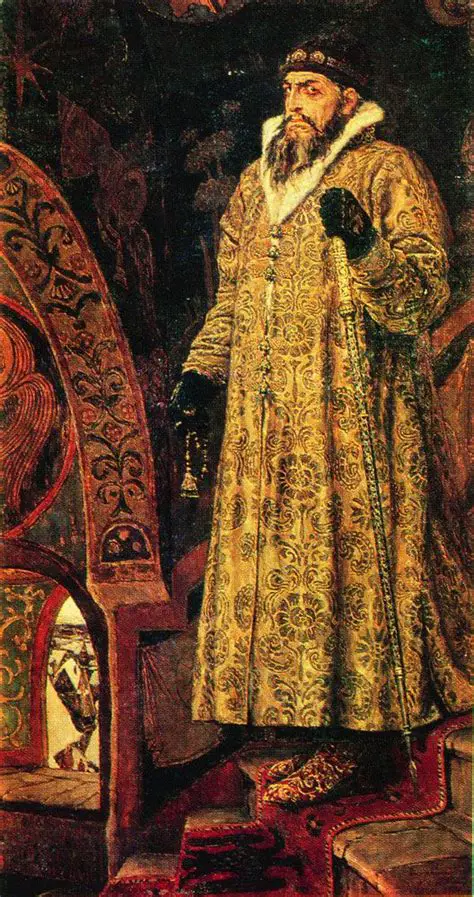Ivan IV’s Reign and its Impact on Russian History
Ivan IV, also known as Ivan the Terrible, was the first ruler of the Russian Tsardom from 1547 to 1584. His reign was marked by significant political, social, and economic changes that had a profound impact on the development of Russia. Ivan IV is widely regarded as one of the most important and controversial figures in Russian history.

Early Life and Rise to Power
Ivan IV was born on August 25, 1530, in Kolomenskoye, near Moscow. His father, Vasily III, died when Ivan was only three years old, and his mother, Elena Glinskaya, became regent. During Ivan’s childhood, Russia was torn by rivalries between the boyars, or powerful landowners. Ivan’s mother was poisoned in 1538, leaving him orphaned at the age of eight.
Ivan’s early experiences shaped his character. He witnessed the violence and instability of his father’s reign and was often neglected and abused by his guardians. These events contributed to his development of a suspicious and tyrannical personality.
Reforms and Expansion
In 1547, at the age of 17, Ivan IV was crowned Tsar of Russia. He quickly began a series of reforms aimed at centralizing power and expanding the Russian state. These reforms included:
- The oprichnina (1565-1572): A system of political terror designed to suppress opposition to Ivan’s rule.
- The introduction of the Zemsky Sobor (1549): A consultative assembly of nobles, clergy, and merchants that played a role in lawmaking and foreign policy.
- The conquest of the Kazan and Astrakhan khanates (1552-1556): Extending Russian territory eastward.
Ivan IV also encouraged exploration and trade. In 1581, the Cossack explorer Yermak Timofeyevich conquered Siberia for Russia, laying the foundation for the country’s vast eastern empire.
Personalities and Policies
Ivan IV was a complex and contradictory figure. He was both intelligent and cruel, and his policies were often characterized by extremes. Some of his key personality traits and policies include:
- Suspicion and brutality: Ivan IV was prone to paranoia and saw enemies everywhere. He ordered the execution of thousands of people, including his own son, Ivan Ivanovich.
- Ambition and expansion: Ivan IV was determined to expand the Russian state and strengthen its power. He waged wars against neighboring countries and sought to establish Russia as a major European power.
- Religious piety: Ivan IV was a devout Orthodox Christian and believed in the divine right of kings. He supported the Russian Orthodox Church and promoted the idea of Moscow as the “Third Rome.”
Timeline of Key Events
| Year | Event |
|---|---|
| 1530 | Ivan IV is born |
| 1538 | Ivan’s mother is poisoned |
| 1547 | Ivan IV becomes Tsar of Russia |
| 1549 | The Zemsky Sobor is introduced |
| 1552-1556 | Russia conquers the Kazan and Astrakhan khanates |
| 1565-1572 | The oprichnina is implemented |
| 1581 | Yermak Timofeyevich conquers Siberia |
| 1584 | Ivan IV dies |
Social and Economic Impact
Ivan IV’s reforms had a significant impact on Russian society and economy. The oprichnina caused widespread destruction and economic disruption. The conquest of new territories led to increased wealth and resources, but also increased the burden on the peasantry.
Ivan IV’s religious policies strengthened the power of the Orthodox Church and promoted the idea of a unified Russian nation. However, they also contributed to conflicts with other religious groups, such as the Old Believers.
Legacy
Ivan IV’s legacy is a subject of debate among historians. Some view him as a strong and ambitious ruler who expanded Russia’s borders and laid the foundations for its future greatness. Others see him as a cruel tyrant who terrorized his own people and set back Russia’s development.
Despite the controversy surrounding his reign, Ivan IV remains a significant figure in Russian history. His reforms and policies had a lasting impact on the development of the Russian state and society.
Impact on Modern Russia
Ivan IV’s legacy continues to cast a shadow over modern Russia. His policies of autocracy, expansionism, and religious intolerance have left a lasting mark on the country’s political and social culture.
Some Russian leaders, such as Vladimir Putin, have drawn inspiration from Ivan IV’s legacy. Putin has sought to centralize power, expand Russian territory, and promote a conservative and traditionalist ideology.
However, Ivan IV’s legacy is also a source of shame and embarrassment for many Russians. His brutality and tyranny are seen as a dark period in the country’s history.
Conclusion
Ivan IV, also known as Ivan the Terrible, was a complex and controversial figure who had a profound impact on the development of Russia. His reforms and policies transformed the Russian state, both internally and externally. His legacy continues to be debated today, with some viewing him as a visionary leader and others seeing him as a ruthless tyrant.
